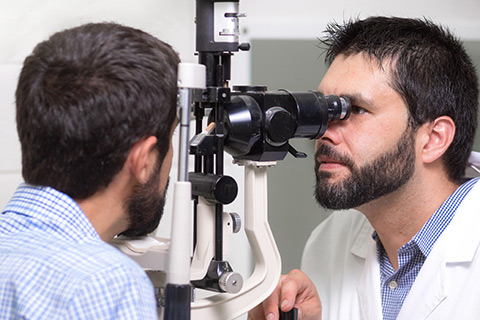Ophthalmic Technician

Quick Facts
- Pathway: Health Science
- Campus: Trinity River
Ophthalmic technicians are involved directly with patient care. Working under the direct supervision of an ophthalmologist, they are responsible for testing and measuring eye functions.
Explore on This Page
Job Titles & Career Info
Our Program
Why Choose Ophthalmic Technician?
- Help & care for others in eyecare settings
- Establish interpersonal relationships with patients & team members
- Use specialized ophthalmic equipment & technology to measure & document patients' eye statuses
- Develop ongoing relationships with patients as well as your eyecare team
Prepare for What You Will Do at Work
- Use ophthalmic equipment to test patients' visions & eye functions
- Teach patients how to use & take care of their corrective lenses
- Take & document patients' medical histories
- Record treatment information in patient records
- Maintain & sterilize medical equipment
Marketable Skills You Will Learn
- Critical thinking
- Reasoning
- Communication
- Personal & social responsibility
- Teamwork
- Computer literacy
Before You Enroll, Think About:
- You will be in constant contact with others—both work colleagues & patients
- These personality traits will help you succeed in your work as an Ophthalmic Technician:
- Attention to detail
- Accuracy in your tasks
- Desire to help others
- Ease with routine
Selective Admission
Ophthalmic Technician is a selective admission program.
After being accepted to TCC, you must meet the selective admission requirements to be eligible to submit a separate application to our Ophthalmic Technician Program.
Get the Details on These Pages:
- About Our Program
- Selective Admission
- How to Apply
- Performance Requirements
- Cost of Attendance in Detail
Licensing Notice: Texas House Bill 1508
This program prepares you for an occupational license. However, you may not be eligible for licensing if you have a prior criminal history.
For more details, see Texas House Bill 1508 Licensing Requirements
Need a boost to get ready for college?
Talk to your advisor about Developmental Studies if your TSI scores say you need some help in math or reading and writing.
Degrees & Certificates
Degree
Certificates
Level 1
Level 2
Attend an Information Session
About the Session
Find out everything you need to know about our program: requirements, courses, costs, and more.
Attending an information session is an application requirement. You will submit your Certificate of Attendance with your application.
Review the presentation slides and contact us if you have any questions: Ophthalmic Technician Information Session (PDF)Listen
Questions?
Health Care Professions Advising Resource Hub
Kimberlyn Moore-Debrossard, Career Advisor
Call 817-515-1484
Email TR.HealthCareAdvising@tccd.edu
Accreditation
Our Ophthalmic Technician program is now fully accredited by the International Council of Accreditation (ICA).
- Ophthalmic Assistant I certificate program was granted continuing accreditation for 3 years in 2023, with the next comprehensive evaluation scheduled for 2026.
- Ophthalmic Technician A.A.S. and Ophthalmic Assistant II certificate were granted initial accreditation in April 2024, with the next comprehensive evaluation scheduled for 2027.
For all inquiries about our program’s accreditation status, contact:
International Council of Accreditation for Allied Ophthalmic Education Training Programs
- Address: 2025 Woodlane Dr., St. Paul, MN 55125, United States of America
- Phone: 651-731-7242
- Fax: 651-731-0410
- International: +1 651-731-7242
How Much Time & Money to Finish?
2024–2025 Academic Year
| Degree or Certificate | Program Title | Semester Credit Hours | Total Tuition & Fees |
|---|---|---|---|
| AAS | Ophthalmic Technician | 60 | $4,440 |
| CRT1 | Ophthalmic Assistant I | 15 | $1,110 |
| CRT2 | Ophthalmic Assistant II | 32 | $2,368 |
Notes:
- Tuition is based on in-state, in-county rates.
- Totals do not include textbooks and other materials.
Continuing Education Programs
Time commitments and fees vary depending on the course.
Earn More Choices & More Money
Transfer to a college or university to continue your studies. Earning a bachelor’s degree opens the door to career and promotion opportunities.
Next steps
- Talk to your advisor about planning for transfer
- Explore transfer schools
Start on Your Pathway!
- Apply to TCC
- Find out about financial aid
- Talk to an academic advisor
- Visit career services
- Request a transcript evaluation if you are transferring to TCC
Contact
Trinity River Campus
Health Care Professions
Advising Resource Hub
Kimberlyn Moore-Debrossard
Career Advisor
Call 817-515-1484
Email TR.HealthCareAdvising@tccd.edu
Advising by Appointment
Fall & Spring Hours
Monday–Friday: 8 a.m.–5 p.m.
Summer Hours
Monday–Thursday: 7:30 a.m.–6 p.m.
Updated August 02, 2024
